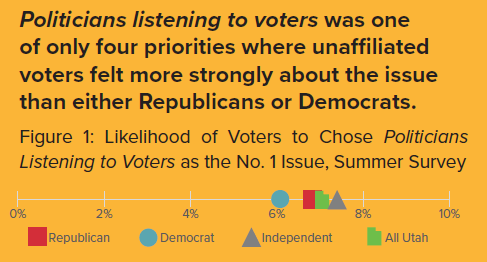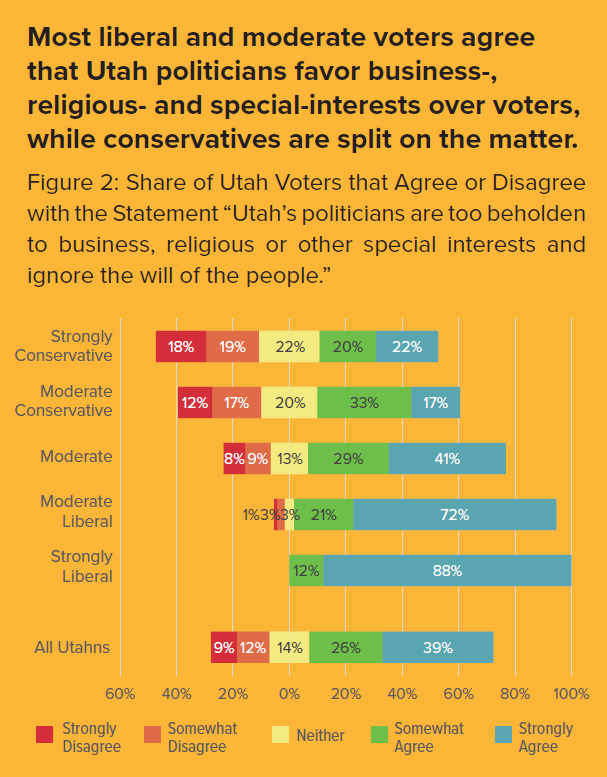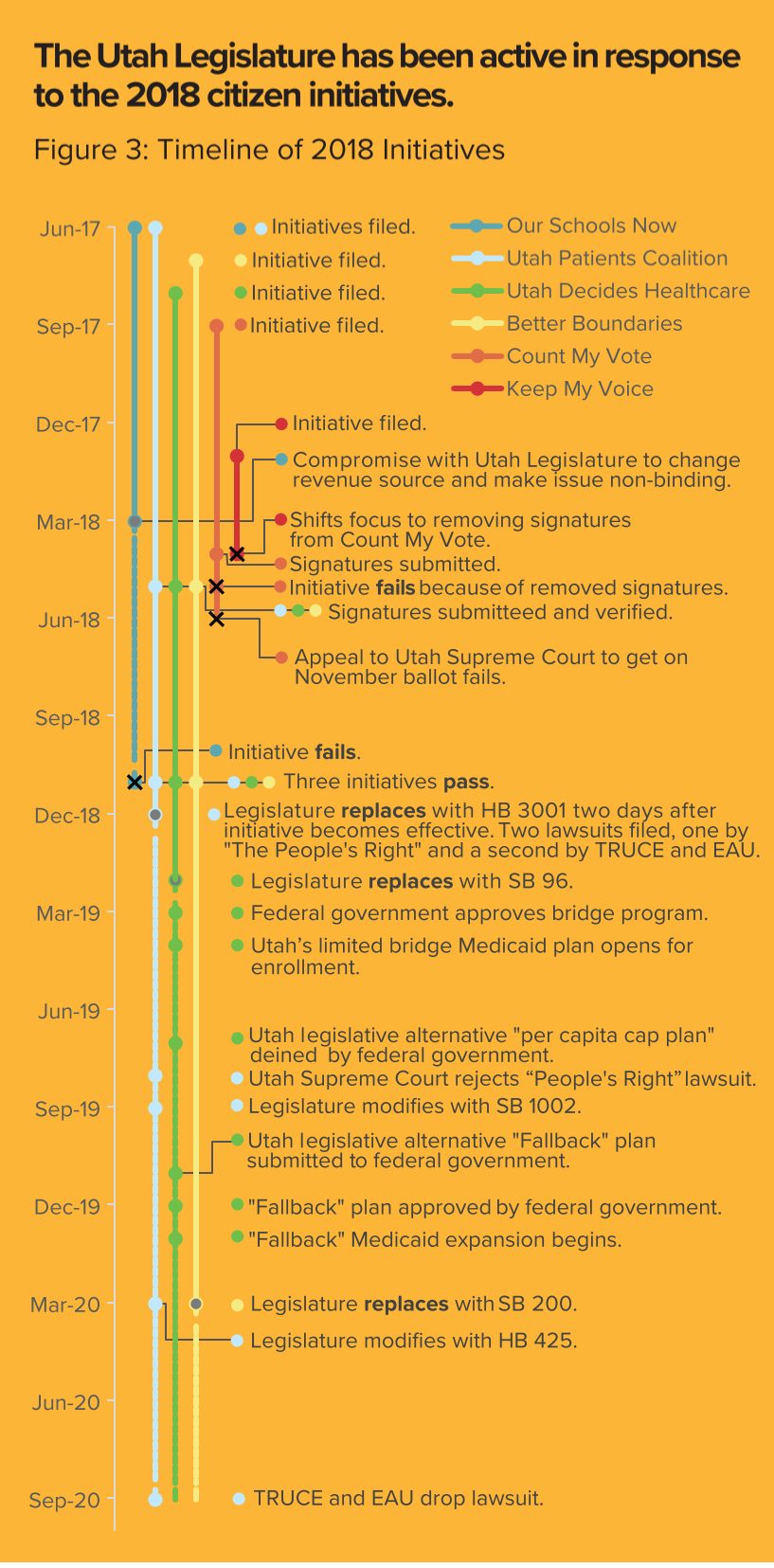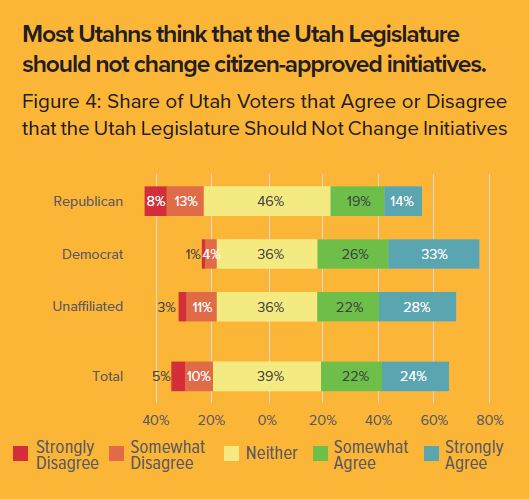Utah Foundation’s Utah Priorities Project survey revealed a new voter priority for 2020: politicians listening to voters. Utah voters complain that elected officials are paying too little attention to voters in favor of corporations, religious organizations, the well-connected or special interest groups. The fact that politicians listening to voters is top-of-mind for voters also encapsulates sentiments regarding legislative changes to ballot initiatives – given that all three ballot measures passed in 2018 were altered by the Utah Legislature.
When prioritized among other issues in early March 2020, politicians listening to voters ranked as the top choice by a substantial margin. However, in the summer Utah Priorities Project survey after the start of the coronavirus pandemic, politicians listening to voters dropped to 6th. Utah Foundation categorized it as “high importance” because, while distinct from the top five issues, it stood substantially above the remaining 12 issues presented to voters in the summer survey. Interestingly, independent voters were more likely to rate the issue as a top priority than were Democrats or Republicans. (See Figure 1.)
Voters or Special Interests
In the Utah Priorities Project’s open-ended responses surveys, many voters said that they believe that policymakers listened to business, religious or special interest groups more than they listened to voters. Utah Foundation included a question in its prioritization survey regarding whether Utah voters thought this was the case. Approximately two-thirds agreed. Nearly as many conservative voters agreed as disagreed that policymakers listened to business, religious or special interest groups more than they listened to voters. However, liberal and moderate voters were much more likely to agree with the statement. (See Figure 2.) Younger voters were also more likely to agree than were their counterparts, as were those who do not identify as members of the Church of Jesus Christ of Latter-day Saints.
Utah is a unique state. No other state has such a large concentration of members of a single religious denomination. Based on Utah Foundation survey data, 57% of Utah voters identify as members of the Church of Jesus Christ of Latter-day Saints. One analysis estimated that nearly 90% of Utah legislators were members of the Church.1 This may not be unexpected since members of the Church are a majority of voters in most of Utah’s districts, though such voters are not necessarily voting based upon their religious affiliation. In some of the open-ended survey responses, Utah voters expressed discomfort over their perception of the Church’s influence. However, voters also expressed concern regarding the influence of businesses and special interests.
Initiatives: Voice of the People
Utah is one of 24 states that allow voter initiatives and referendums. In Utah, voter initiatives can be used to directly pass legislation or indirectly propose legislation to the Utah Legislature. Referendums are used to veto current law. While Utah was the first state to allow voter initiatives and referendums, it employs them relatively infrequently.2 During the past two decades, there have been 23 proposed voter initiatives. Only six made it to the ballot, and voters approved only three – all of which passed in 2018. All three of these were later modified in varying degrees by the Utah Legislature.3 (See Figure 3.)
Because so many of the open-ended responses to Utah Foundation’s survey focused on 2018 voter initiatives and subsequent legislative changes, Utah Foundation asked voters whether they believed that the Utah Legislature should not change citizen initiatives even if the initiatives are “not the best way to pass policy.” While 40% of Utah voters were ambivalent on the topic, those with an opinion who agreed with the statement outnumbered those who disagreed by three to one. (See Figure 4.) Democrats were more likely than Republicans to indicate that the Utah Legislature should not change citizen initiatives.
This research brief was written by Research Analyst Christopher Collard and Research Assistant Abaigael Peterson.
Endnotes
- ^Lee Davidson, “Who has a bigger supermajority than even Republicans in Utah’s Legislature? Latter-day Saints,” The Salt Lake Tribune, January 21, 2019, www.sltrib.com/news/politics/2019/01/21/who-has-bigger/.
- ^Utah was the first state to allow initiatives, however, supporting legislation wasn’t passed for another 17 years. See National Conference of State Legislatures, 2012, “Initiative states ranked in order by use,” www.ncsl.org/research/elections-and-campaigns/initiative-states-ranked-in-order-of-use.aspx.
- ^Ballotpedia’s list of ballot measures, 2002-2020. For example, see https://ballotpedia.org/Utah_2002_ballot_measures. Two more voter initiatives were not placed on the ballot, but may merit mention: a 2018 initiative to raise income and sales taxes for schools and a 2020 initiative to revert a tax package including an increase on the sales tax on food and a reduction on income tax. The 2018 initiative ended with intervention from the Utah Legislature that drove a compromise to replace an increase in school taxes with a non-binding question regarding whether Utah should increase motor fuel taxes that would be used for roads but free up funds otherwise dedicated for roads for education. This non-binding question on the ballot subsequently failed. The 2020 initiative, however, gathered so much popular support so quickly, that legislators pre-empted the issue from going to the ballot by adopting the changes in a subsequent special session.





